The Real Event Management Skills Nobody Teaches You
Will Townsend
·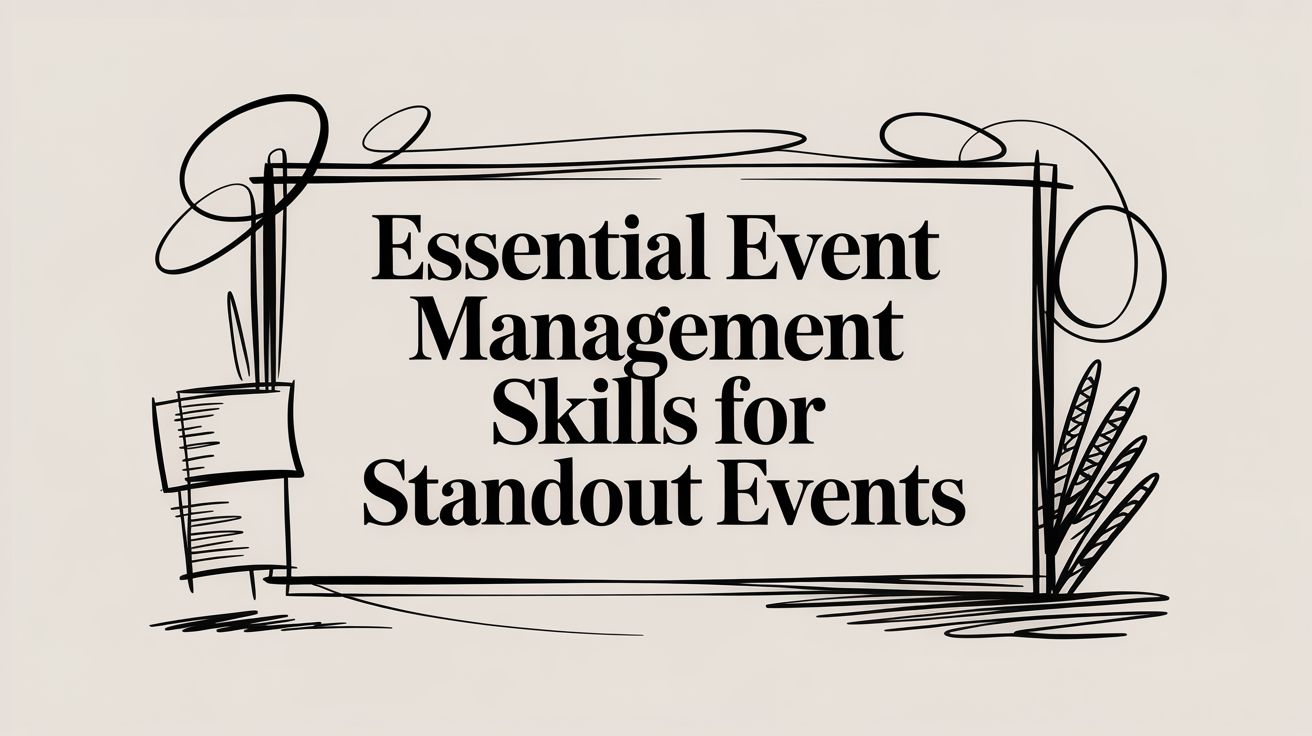
Let’s get one thing straight. Real event management isn't about picking the perfect font for invites. It’s the gritty, thankless, behind-the-scenes work that stops your brilliant idea from becoming a dumpster fire.
Think of it like building a house. Budgeting, planning, negotiation, and people skills are your foundation. Get those right, and you can build anything. Get them wrong, and the whole thing crashes down.
What Skills Actually Make or Break Your Event
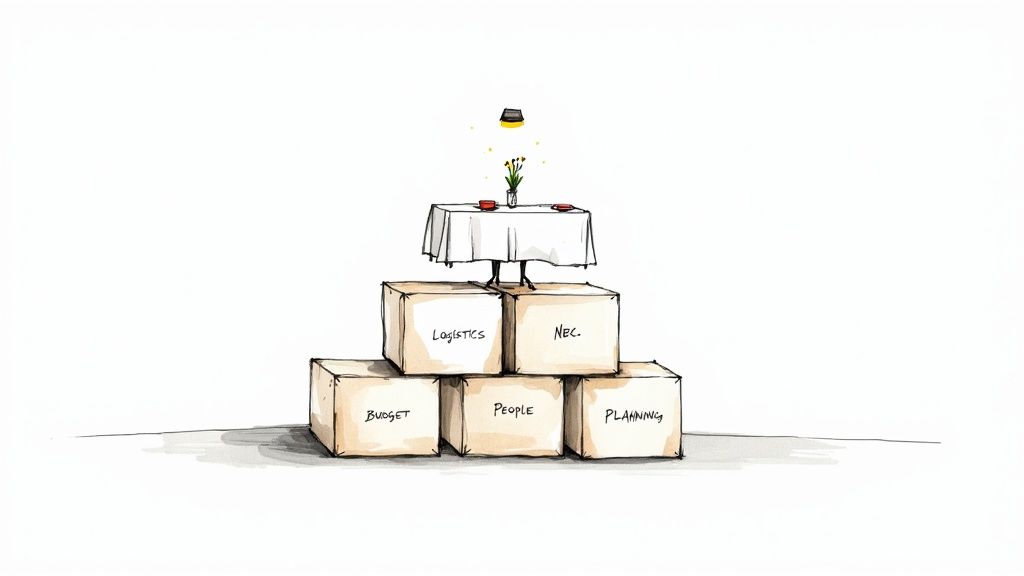
Honestly, planning an event is mostly managing chaos. It doesn't matter if it's a pop-up dinner for 20 or a local festival for 200. You’re a firefighter, a negotiator, a spreadsheet wizard, and a part-time therapist.
The glamorous clipboard-wielding guru is a myth. The reality is ninety percent staring at spreadsheets. The other ten percent is praying the caterer remembers to bring forks.
This guide is for the doers. The workshop hosts, pop-up chefs, and local organizers. The people pouring their hearts into creating something special. We’ll skip the theory and jump into the practical skills that keep disaster away.
The Gritty Fundamentals
Forget the fluff. Successful events are built on a few hardcore skills. Nobody claps for a balanced budget, but everyone notices when you run out of ice.
Financial Acrobatics: Can you draft a budget that includes a surprise $300 permit fee? Do you know how to price tickets so you actually make money? This is where events live or die.
Logistical Juggling: This means timelines that work in the real world. It's having a Plan B (and C) when your main speaker gets the flu 24 hours before showtime.
Herding Cats (aka People Management): You have to wrangle vendors, volunteers, and anxious attendees. All while smiling. Clear communication is the only thing keeping it together.
Fearless Negotiation: Asking a venue for a 10% discount feels awkward. But that 10% might be the difference between breaking even and losing your shirt.
These aren't nice-to-haves. They're the bedrock of a good event. Without them, your brilliant idea becomes an expensive, public headache. I learned that the hard way. Now I don't plan anything without a solid checklist. A simple event planner checklist sample can be a total lifesaver.
Throughout this guide, we'll break down each of these skills with real examples and straight advice. The goal is to give you a framework to go from idea to a room full of happy people, without losing your mind.
Mastering Your Event Budget Without a Finance Degree
Alright, let’s talk money. The one thing that gives every event host nightmares. No, you don't need to be a spreadsheet wizard. Think of your budget as a roadmap. It turns your idea into a real thing.
This isn’t about becoming a CPA overnight. It’s about tracking every dollar, making smart calls when costs pop up, and knowing where the money pits are hiding.
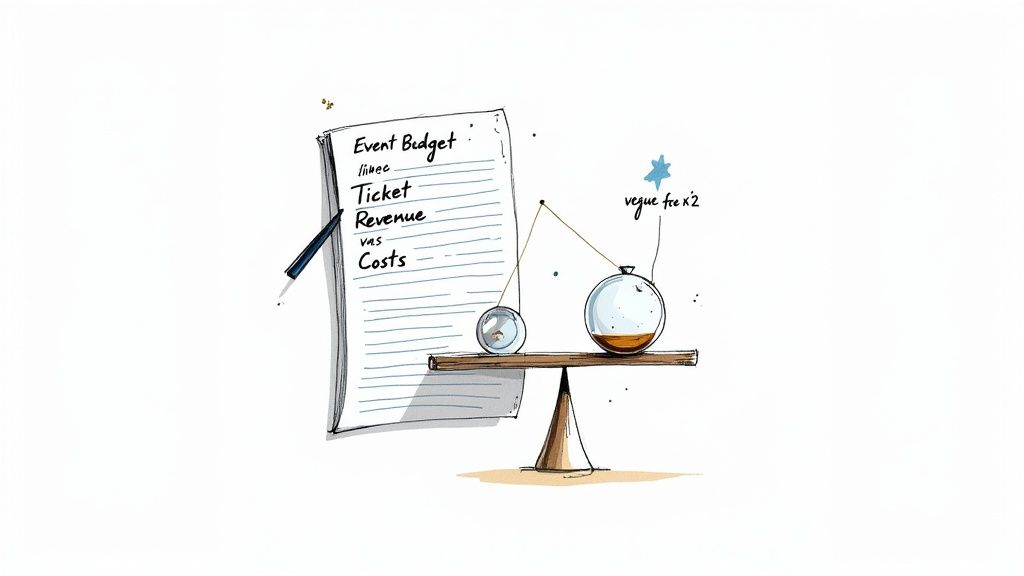
Uncovering the Hidden Costs
First-time organizers get tripped up by the same things. It’s never the big expenses like the venue. It's the swarm of small, sneaky costs that sink your profit.
Think you have catering locked down? It's common for planners to underestimate food costs by 30% or more. Did you remember the $500 event insurance policy the venue demands? What about payment processing fees, last-minute ad boosts, or printing name tags?
These "little" things add up fast. Your secret weapon is a contingency fund. A buffer of at least 10% of your total budget gives you breathing room for surprises. To get ahead of them, map out every potential expense using our guide on budgeting for an event.
A Real-World Budget Crisis (And How We Survived It)
Let me tell you a story. I was putting on a 75-person workshop. Two weeks out, the venue manager calls. They’d double-booked our space. Their solution? A bigger room for double the price. An extra $800 I did not have.
Canceling was not an option. Refunding tickets and losing vendor deposits would have cost me over $1,500.
Time to pivot. Fast. I called the caterer and switched from a hot lunch to high-end boxed lunches, saving $350. Next, I scrapped printed programs for a slick digital version, saving another $120. Finally, I created a "last chance" ticket tier at a higher price, promoted it hard for 48 hours, and brought in an extra $450.
It was a scramble. But we covered the new venue fee without hurting the workshop's quality.
That’s what financial management looks like. It’s less about perfect spreadsheets and more about creative problem-solving when things go sideways. Your budget is a living document, not a stone tablet.
This skill is only getting more important. Projections show that 19.6% of planners expect to deliver a higher return on investment by 2025. That puts more pressure on us to manage costs like a hawk. You can dig into more of these trends over at swoogo.events.
Predictable Costs Save Your Sanity
It's tough to find solid ground when costs shift. But one variable you can control is how you collect money. Many ticketing platforms take a percentage of every sale. A fee like 2.9% plus $0.30 per ticket feels small. But sell 100 tickets and that's real money. Money that could've gone to a better speaker.
This is why we're building Ticketsmith with a simple, flat fee. You know the cost upfront. No surprises. It’s a tool for people pouring their hearts into events who need every dollar to count. If that sounds like you, come join the waitlist at ticketsmith.co.
The Art of Herding Cats and Managing People
Your event is only as good as the people bringing it to life. And people are complicated. Mastering the people side of event management is less about being a boss and more about being a diplomat.
This is the art of herding cats. You're juggling vendors who only respond via text, volunteers who need clear instructions, and attendees with a million questions. It all comes down to how well you communicate.
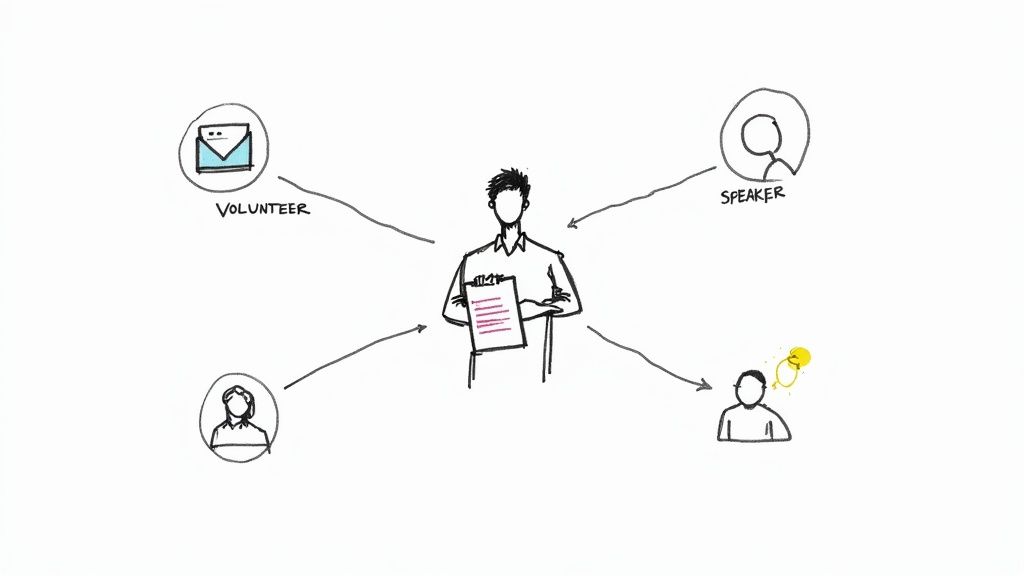
When your people management is on point, everyone is on the same page. Without it, you get chaos.
Writing Emails That Actually Get a Reply
Let's be real: your inbox is a battleground. To win, your emails need to be sharp and concise. Nobody has time to read a novel.
Start with a direct subject line. Ditch "Event Update" for "Action Required: Final AV Needs for Saturday Workshop." This tells them what you need and when.
Follow three rules for every email:
One Goal Per Email: Don't ask for their invoice, headshot, and social media handles in one message. Stick to a single request.
Bold Your Deadlines: Make the due date impossible to miss. "Please send your presentation by Friday, June 14th."
Use Bullet Points: Break down complex info into a scannable list. This makes your request easier to act on.
This isn’t just about being efficient. It's about respecting other people's time.
The Vendor Negotiation Two-Step
Negotiating with vendors doesn't have to be a high-stakes poker game. The secret is to be prepared and polite. You're building a partnership that works for both of you.
First, do your homework. Get quotes from at least three different vendors for the same service. This gives you a realistic price range.
Second, always ask, "Is this price flexible?" It’s a simple, non-confrontational question. The worst they can say is no. More often, they can offer a small discount or waive a fee. That one question once saved me $250 on chair rentals.
A good negotiation ends with both sides feeling like they got a fair deal. You want vendors who are happy to work with you. That goodwill pays off when you need a last-minute favor.
When Your Keynote Speaker Bails
Okay, let's talk about a real disaster. I was running a design workshop for 50 people. The main speaker emailed me 48 hours before the event. He had the flu and couldn't make it.
Panic set in for about five minutes. Then, I got to work.
Step 1: Find a Replacement. I immediately emailed three other local designers. I was brutally honest: "This is a last-minute emergency, I can offer the original speaker's $500 fee, and you would be an absolute hero." One of them said yes within the hour.
Step 2: Control the Narrative. Before rumors started, I sent a carefully worded email to all attendees. It was honest but confident. I didn't hide the problem. I framed the solution.
I’ve linked the messy, caffeine-fueled Google Doc with the exact email template I used. It acknowledged the change and highlighted the new speaker's strengths. In the end, only two people asked for a refund.
This is what people management is really about. It's having the communication chops to turn a catastrophe into a minor hiccup.
How to Nail Event Logistics and Planning
Logistics are the invisible scaffolding holding your event together. When you get it right, nobody notices. When you get it wrong? It’s all anyone talks about.
This isn’t the glamorous side of event planning. It’s the nitty-gritty work of building realistic timelines and having a rock-solid Plan B. It's easily one of the most crucial skills you can build.
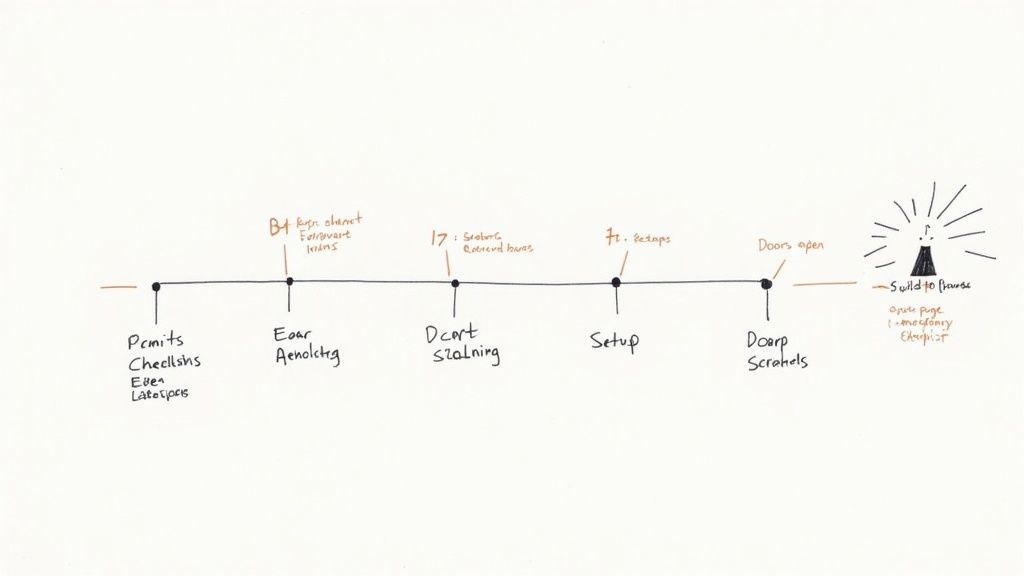
From Ticket Purchase to Thank-You Email
The attendee's journey begins the moment they land on your event page. Nailing logistics means thinking through every step of that experience.
Discovery & Ticketing: Is your event page clear? A clunky checkout is the fastest way to lose someone.
Pre-Event Communication: A good confirmation email is standard. A great "know before you go" email a week out—with parking tips—is even better.
Arrival & Check-in: Are the signs obvious? Is check-in a breeze? Nothing sours the mood like a long, confusing line.
The Main Event: Can people find the restrooms? Is the schedule running smoothly? Are transitions seamless?
Departure & Follow-up: A follow-up "thank you" email with a simple survey is a classy move that gets you great feedback.
This level of detail is non-negotiable as the events industry explodes. Projections show the market hitting $1,346.92 billion in 2025, with 74.5% of planners now using hybrid formats. You can dig into stats like these over at remo.co. In a crowded space, great logistics is how you stand out.
The Sprinkler Incident and the Emergency Checklist
Let me tell you about a time my logistics failed spectacularly. I was hosting an outdoor pop-up dinner for 50 people in a park. Everything was perfect. Until 7:15 PM, when the park’s automatic sprinklers roared to life, drenching two tables.
My mistake was huge. I had the permit, but I never asked about the sprinkler schedule. Total amateur hour. Chaos ensued as we scrambled to move 50 people and ten tables in under ten minutes.
A messy, one-page emergency checklist saved the night. It had volunteer contact numbers and a map to our backup spot. It turned a catastrophe into a funny story. After paying a $200 dry cleaning bill for one guest, that checklist became a core piece of our guide on event execution and operations.
Logistics isn't just about what you plan for. It's about how you prepare for what you can't control. Your backup plan is as important as your main plan.
Freeing Up Brainpower for What Matters
Wrestling with code to build a ticketing page is a massive drain on your energy. That's brainpower you should be spending on critical details. You know, like sprinkler schedules.
A simple ticketing tool can get your page live in minutes. No code, no fuss. You get a custom-branded page that looks professional, with secure payments and fast payouts. We're building Ticketsmith so you can get the technical stuff done quickly and get back to the real work. It’s for people who need to focus on creating an amazing experience, not on becoming a part-time web developer. If that sounds good, you can join the waitlist at ticketsmith.co.
Using Simple Tech to Punch Above Your Weight
You don't need a massive budget or a team of developers to run your event like a pro. The right tech can make a one-person show look like a full-fledged agency. Thinking this way is a core event management skill.
This isn’t about shelling out for some thousand-dollar software suite. It’s about using simple tools to automate the tedious stuff.
Think of event management software as your tireless assistant. Its job is to handle repetitive tasks—registration, payments, communication—so you can focus on creating an unforgettable experience.
Your Unfair Advantage is Simplicity
Big corporations have teams for logistics. You have you. That’s why your tools need to be ridiculously easy to use. The best tech gets out of your way and just works.
What does that look like?
A Branded Ticketing Page: It should look like your event, not the ticketing company’s. Good software lets you add your logo and colors in minutes, with zero code.
Secure, Hands-Off Payments: Your tool should handle all payment processing and get the money into your account, fast.
Predictable Pricing: Stay away from platforms that skim a percentage off every ticket. A flat fee makes your budget far more reliable.
The market for these tools is growing for a reason. Valued at $6.63 billion in 2018, it’s projected to hit $28.13 billion by 2031. Last year, 65% of companies increased their software use. This stuff is a critical tool for small creators. You can learn more about these trends on eventbrite.com.
Your Next Event Starts Now
Okay, that was a lot. But here's the secret: you don't need to master all of this overnight. The best way to build real-world event management skills is by managing events.
Start small. Seriously. Host a workshop for ten people. You will make mistakes. That’s okay. Learning what doesn't work is often more valuable than knowing what does.
The Foundation Is Simple
It’s easy to get lost in details. But it's the core principles that make or break an event. If you can keep these three things front and centre, you’re miles ahead of most.
Be a hawk with your money. Know where every single dollar is going. Your budget is your reality check.
Talk to everyone, clearly and often. Keep your vendors, attendees, and volunteers in the loop. Confusion is the enemy.
Always have a Plan B. What happens if your speaker gets sick? A backup plan turns a catastrophe into a minor hiccup.
This is the stuff that separates a chaotic mess from an event that feels effortless. Your guests won’t see your balanced budget but they will notice if the check-in line is a disaster.
The Right Tools Make All the Difference
Tired of giving a huge slice of your ticket sales to platforms with confusing, percentage-based fees? We feel that. It's why we’re building a tool for creators like you—the pop-up chefs, workshop hosts, and community organizers. The goal is simple, honest event ticketing.
We let you set up a clean, branded page in minutes. We handle secure payments and get you your money fast, all for one flat, predictable fee. No surprises. It works whether you have five attendees or 5,000. It's a platform built for real people pouring their hearts into their events.
If you want a ticketing partner that's actually on your side, take a look at what we're building.
Your next event is where all this theory gets real. Don't wait for the perfect moment. Just start.
We’re in waitlist mode, but we'd love for you to be among the first to try it out. Join the waitlist at ticketsmith.co and we’ll let you know the second we go live.
Still Have Questions?
You’ve got questions. That's a good sign. It means you’re thinking through the right things. Let’s tackle a few common ones.
What's the Single Most Important Skill for an Event Organizer?
Budgeting. Without a doubt.
Think about it. Almost every other problem can be solved if you have a handle on your finances. A brilliant idea with no money is just a daydream. But a simple idea with a smart budget can become a successful event.
If you can't map out your costs and price tickets to make a profit, you’re setting yourself up for stress. Start with a spreadsheet. Be brutally honest about every single line item.
How Can I Get Event Planning Experience if I Have No Portfolio?
Volunteer. It's that simple.
Find a local festival, a charity 5k, or a conference you love and offer to help for free. Don't just say you'll do "anything." Be specific. Ask to shadow the coordinator or take on a small task, like managing the check-in table for a two-hour shift.
You will learn more in one chaotic afternoon of real-world problem-solving than from reading ten books. It’s the fastest way to see these skills in action.
What Is the Biggest Mistake New Event Hosts Make?
Failing to create a Plan B for their most critical parts. It’s a classic rookie error. Most new organizers get so wrapped up in their ideal scenario that they never stop to ask, "What if?"
What happens if your venue cancels? What if your speaker gets sick? What if your ticketing site goes down on your biggest sales day?
You don't need to go overboard with a fifty-page crisis manual, you can start with a "if this, then that" for your three most vital elements:
Your venue
Your main attraction (speaker, performer, etc.)
Your tech stack (ticketing, AV, payments)
Having that backup plan is the difference between a meltdown and a minor pivot. It's a true test of your mettle as an organizer.
We're building Ticketsmith to take the tech part of that equation off your plate. It's a simple, honest ticketing platform for creators who need things to just work. Set up in minutes, brand it like yours, and get paid fast—all for a flat fee. No surprises.
We're currently in waitlist mode. We’d love for you to be among the first to try it out. Join the waitlist at ticketsmith.co and we’ll let you know the second we go live.
Join the waitlist
Be the first to know when Ticketsmith launches. Get exclusive access and early-bird pricing.
Written by
Will Townsend
Founder, Ticketsmith
Writes practical guides on event ticketing, pricing, and promotion for independent organizers.